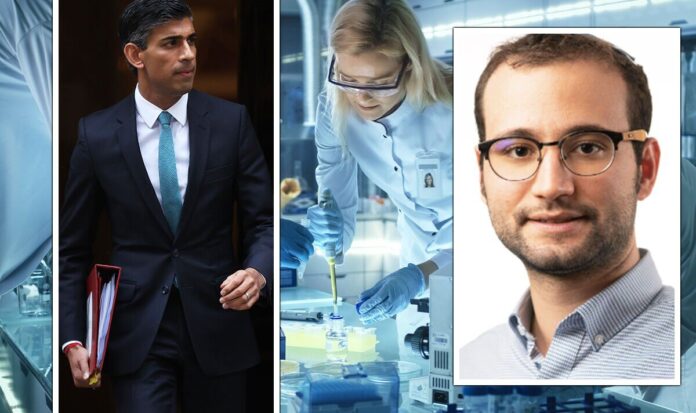An Israeli scientist collaborating with British researchers has welcomed the ‘fantastic opportunity’ of a UK-Israel deal which could be on the cards as Britain scrambles to replace the EU with other science power houses after it was booted out of the bloc’s flagship innovation programme. The UK’s access to Horizon Europe, an £80billion scheme that provides prestigious EU grants to researchers and facilitates collaboration between associated countries – has been blocked for nearly a year and a half – despite the UK’s participation being a feature of the Trade and Cooperation Agreement after Brexit.The bloc told Britain it can only take part once the Northern Ireland dispute is smoothed over, but this has needlessly dragged in researchers who were promised sizeable grants, and now face having that funding cut.But it may not all be bad news. Several months ago, former Science Minister George Freeman announced that he had a ‘Global Plan B’ if the EU continues to bloc the UK from Horizon.It involves striking deals with science powerhouses from across the world to collaborate with, as well as ensuring the Government provides the scientists grants that would have otherwise been administered by the EU under Horizon.While Mr Freeman stepped down as Science Minister following the spate of resignations that sparked Boris Johnson’s downfall, he has previously told Express.co.uk he talked Prime Minister Rishi Sunak through his £15billion global plan for science. Israel is eager for a science deal with Britain (Image: Getty/Twitter/Technion) The EU told Britain it cannot take part in Horizon Europe until the Brexit dispute is resolved (Image: Getty )And as he was formulating his master blueprint, the former Science Minister headed to Israel to explore striking a deal.Not only would this benefit British researchers eager for grants, but Israel would be set to benefit from the top brains from the UK.But currently, there are not enough funding programmes for Israeli scientists to sign up to in Britain, Dr. Joachim Behar, from the Artificial Intelligence in Medicine Laboratory in Technion University in Israel, told Express.co.uk.Dr Behar is already working on one project with professors from Cambridge University and Queen Mary University, in which they work on deep machine learning techniques to help diagnose specific diseases.READ MORE: Rishi facing farmer fury as Truss slammed for keeping hated EU law Dr Behar said a UK-Israel science deal would be (Image: Twitter/Technion)However, he stressed that collaboration with Britain would become even stronger if there were more funding schemes open, with his current project funded only via a donation from Technion UK. But soon, the Government could help to take Israeli-British science collaboration a step forward.Dr Behar said: ‘We didn’t receive much funding to be honest- between around £20-30,000 pounds. Compared to other countries which have grant schemes with Israel, I haven’t found such schemes with the UK. With the UK I have a lot of scientists that I want to work with…but we haven’t found an easy way to work together.’But when told Express.co.uk could be working on a new science deal as part of the ‘Global Plan B’, he warmly welcomed the news. DON’T MISS UK government pinpoints exact times UK homes to face winter blackouts [REPORT] POLL: Is Rishi Sunak right to keep fracking ban? [POLL] Expert claims Putin has terrifying plot after multiple cables severed [INSIGHT] Mr Freeman visited Israel back in March where an R&D agreement was reached (Image: Twitter ) It is hoped that a collaboration will lead to “serious work” the field of AI in healthcare (Image: Getty )He told Express.co.uk: ‘It will be fantastic, I would love that. I am not looking for partners as I already have them, but a scheme is really what has been missing.’Dr Behar later added: ‘There are big pools of funding like Horizon programmes, and then there are more moderate pools that enable researchers to start working together. The hope is that this will build a relationship that will lead to a bigger application. Something between £80-100,000 will be able to start a collaboration to lead to some serious work in our field of AI (artificial intelligence) over two years.’This comes after Mr Freeman visited Israel back in March, where an agreement was reached for collaboration on research and development (R&D) between Britain and Israel. The former Science Minister tweeted following his visit: ‘Thank you to all the brilliant scientists, entrepreneurs, investors and policymakers in Israel for a brilliant visit and agreement on a new UK-Israel R&D collaboration.’The British Embassy in Israel tweeted: ‘Science and innovation has always been an important link between Israel and Britain. George Freeman MP spent his first visit here learning about exciting collaborations in science, research, technology and much more. Together we are stronger, smarter and more creative.’


